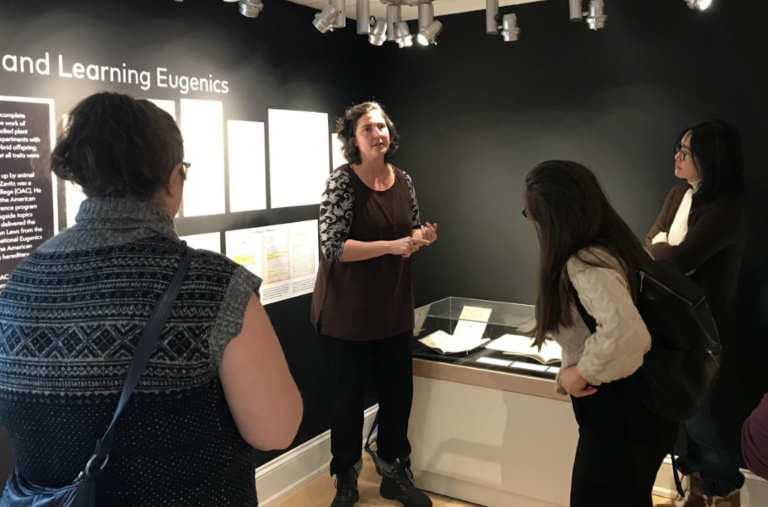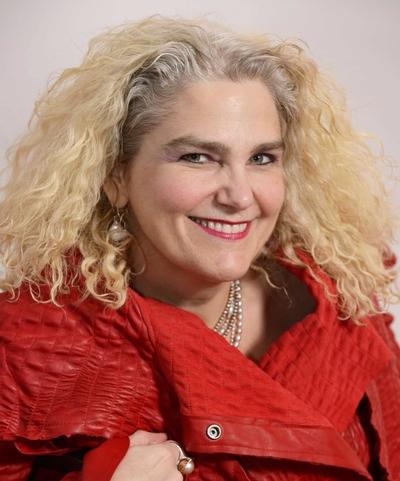Shining a light on the lasting effects of eugenics is the aim of a new online learning source assembled by a team of survivor-activists, artists and scholars brought together by University of Guelph researchers.
“Into the Light: Living Histories of Oppression and Education in Ontario” is a new teaching tool designed to build awareness about the ongoing effects of eugenics – the belief that humanity can be improved by eliminating “undesirables.”

“Into the Light” builds on an award-winning activist art exhibition of the same name that opened at the Guelph Civic Museum in 2019. The idea to create an online learning source using exhibition artifacts, stories and research emerged through a series of conversations between research associate Dr. Evadne Kelly and Dr. Carla Rice, Canada Research Chair in Feminist Studies and Social Practice in the College of Social and Applied Human Sciences, to help educators reveal and counter the long-hidden history of eugenics in Ontario.
The online learning resource, funded by eCampusOntario and the U of G Learning Enhancement Fund, is the next chapter in the team’s research project to tell the past and ongoing history of eugenics in Ontario from the perspective of four survivor-activists.
In each of three modules, the survivors share how eugenics affected their lives, through audio, visual and textual stories, with the aim of sparking discussion and generating change.
Project tells the past and ongoing history of eugenics in Ontario

“We wanted to prioritize lived experience as expert knowledge. The experiences of the four people who tell their stories through video and other media are the primary stories,” said Kelly.
Those storytellers are Anishinaabe Elder Mona Stonefish, co-curator of “Into the Light”; Peter Park, an activist who advocates for people who have been labelled with an intellectual disability; and Marie Slark and Antoinette Charlebois, two sisters who tell how they were taken away and separated by the Children’s Aid Society and placed in institutions.
“All of them have been directly affected and have become survivor-activists,” said Kelly. “They have been denied and silenced for so long and we wanted to be able to say, ‘We hear you. Tell us your truth.’ We also wanted their truths to inform the future, so it was important for them to be part of the design process on this new resource.”
Visitors to the site are invited to listen to the stories thoughtfully and carefully, reflecting on their own connections to the destructive effects of colonialism, ableism and belief systems that see certain people as unworthy.
Although eugenics is often associated with past regimes, the oppressive ideas have been spread here in Ontario through policies that devalued and harmed First Nations, Black and other racialized communities, those living with disabilities or in poverty, Kelly explained.
These policies were practised through assimilation programs like residential schools, the institutional confinement of those labelled mentally disabled, restrictive family laws and coercive sterilization.
In the early part of the 20th century, eugenics was openly taught in higher learning institutions throughout southern Ontario, including at the University of Guelph.
Online resource to continue to spread knowledge about history of eugenics in education
While conducting archival work for the Into The Light exhibit, Kelly found documentation of eugenics courses taught at the Macdonald Institute and the Ontario Agricultural College, two of U of G’s founding colleges.
“Thanks to the tremendous help of Kathryn Harvey, the head of archives and special collections, we found hundreds of documents that show how oppression and eugenics was taught as a way of improving race in anthropology, biology, psychology, home economics and more,” said Kelly.
Visitors to the site can review a curated selection of these documents that expose how these ideas were openly promoted.
“While it has been gratifying to see the University being accountable to this history and trying to address it, this project has always been about the bravery of the survivor-activists who have worked to expose all of these histories for decades,” said Kelly. “The archival documents are only there to help support their story and to help people to start listening.”
Kelly and Rice hope educators will use the Into the Light online resource to continue to spread knowledge about the past as well as the ongoing history of oppression and continuing activism to fight it.
“It’s not as simple as knowing our histories. It’s much more complicated,” said Rice. “We need to understand and continuously question our emotional attachments to and intellectual investments in the false and profoundly injurious idea that we can and should control the direction of life.”
The project was made possible through several partnerships, including with ARCH Disability Law Centre and Bodies in Translation: Activist Art, Technology and Access to Life.
Contact:
Evadne Kelly
evadne@uoguelph.ca
Dr. Carla Rice
carlar@uoguelph.ca
